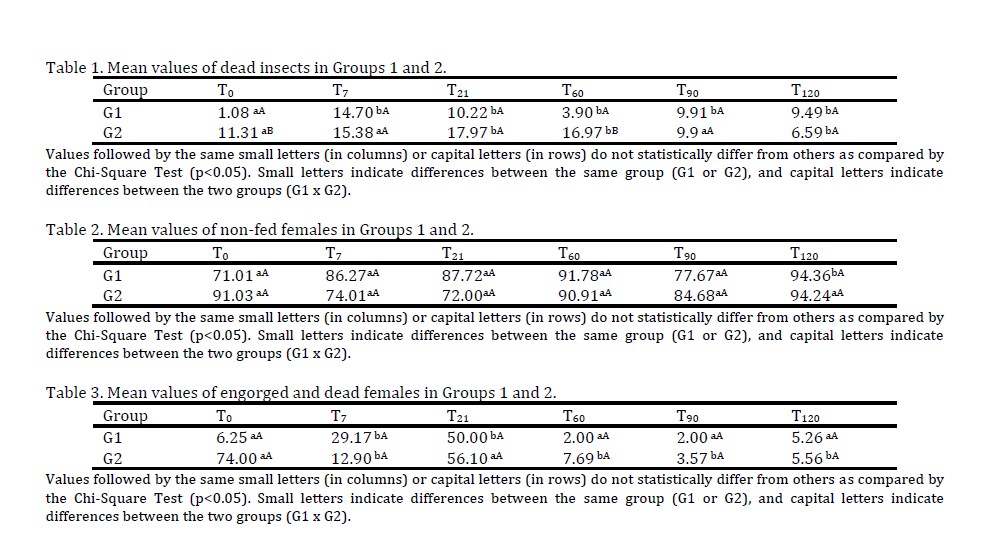Evaluation of the antifeeding and insecticidal effects of a deltamethrin-impregnated collar on Lutzomyia longipalpis
DOI:
https://doi.org/10.21708/avb.2019.13.4.8331Resumo
Canine leishmaniasis (CanL) is a vector-transmitted zoonotic disease that can be prevented using topical insecticides. Deltamethrin-impregnated collars (DMC) are an efficient method applied to dogs to prevent CanL; however, few reports have analyzed the efficiency of these collars, especially in dogs that are frequently bathed. The purpose of this study was to evaluate the antifeeding and insecticidal outcomes of a DMC used in dogs. DMCs were used on 12 mongrel dogs. Dogs were exposed to phlebotomine sand flies before the use of DMC and at 7, 21, 60, and 120 days after donning a DMC. Six dogs were bathed biweekly, and six were not bathed during the experiment. After exposure, sand flies were captured and classified as dead, alive, male, and engorged or non-engorged females to calculate the antifeeding and insecticidal effects. The use of a DMC showed insecticidal effects on male and female sand flies, with minimal effects in engorged females. The prevention of blood-feeding by sand flies were also observed. The insecticidal and antifeeding effects were better in bathed than in non-bathed dogs, showing that baths did not influence the effects and can be continued during control of CanL. Our results indicate that DMC can be used to control CanL but should be used combined with other control measures.
Downloads

Downloads
Publicado
Edição
Seção
Licença
Autores que publicam na Acta Veterinaria Brasilica concordam com os seguintes termos: a) Autores mantém os direitos autorais e concedem à revista o direito de primeira publicação, com o trabalho simultaneamente licenciado sob a Licença Creative Commons Attribution que permite o compartilhamento do trabalho com reconhecimento da autoria e publicação inicial nesta revista. b) Autores têm autorização para assumir contratos adicionais separadamente, para distribuição não-exclusiva da versão do trabalho publicada nesta revista (ex.: publicar em repositório institucional ou como capítulo de livro), com reconhecimento de autoria e publicação inicial nesta revista. c) Autores têm permissão e são estimulados a publicar e distribuir seu trabalho online (ex.: em repositórios institucionais ou na sua página pessoal) a qualquer ponto antes ou durante o processo editorial, já que isso pode gerar alterações produtivas, bem como aumentar o impacto e a citação do trabalho publicado (Veja O Efeito do Acesso Livre).


 Esta obra está licenciada com uma Licença
Esta obra está licenciada com uma Licença 